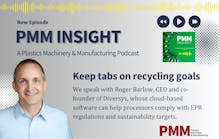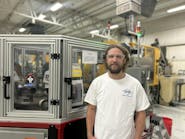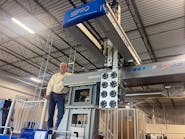By Ron Shinn
We are on the cusp of traditional isolated automation in manufacturing evolving into a more efficient model where humans and robots work side by side. You could argue that we are already well on this path, but I believe we are now just at the very beginning and there is no way to tell how far the collaboration will go.
Artificial intelligence (AI) makes this possible. I am not talking about the ChatGPT AI that some headline writers warn may take over the world. This is about AI that is already becoming embedded in our molding machines, dryers, material handling systems, robots and recycling equipment.
A thought-provoking blog post on the EU Automation website, “Collaborative Robots in Manufacturing: Embracing the Future,” asks if we should be concerned about the increasing role of AI and robotics. My answer is no. Bring it on!
The plastics industry is already a significant user of traditional robots, mostly for machine tending and some post-molding tasks. Collaborative robots are starting to be seen in clean rooms and in injection molding plants where labor shortages have reached a critical stage.
Most processors I talk with are comfortable with traditional robots and are starting to warm up to cobots. But mention AI, and processors give you a blank look, or voice concern that they do not understand AI or worry they will lose control of their manufacturing plant to an AI-powered machine.
But AI is a tool, just like the robot. Think about it this way: Robots and cobots can gather information about the tasks they are assigned, while AI systems can analyze the data to tweak the operation.
The last couple of recycling plants I visited had robots sorting plastic waste. The robots can learn the different materials they see through sensors and sort the waste according to the recycler’s needs.
Separating plastic waste is the first baby step for AI in the recycling business. One collection company in California has equipped its trucks with AI-powered cameras and sensors that look at everything going into the truck and use GPS data to identify addresses that dispose of prohibited items.
Trash collection and recycling are not industries known for collecting and utilizing data, but those industries are quickly becoming comfortable with AI.
At the K Show last year, several molding machinery manufacturers touted control systems that can analyze machine performance and change settings on the fly. No human intervention is required.
Everyone should be able to appreciate that. Robots and AI systems can be programmed to efficiently handle repetitive tasks, which improves production rates and reduces operational costs. Dangerous jobs can be assigned to robots instead of humans.
Using a robot with AI improves processing accuracy and quality control.
You could make the argument that how well a processing plant uses automation and embraces AI will determine its future. Machine learning, natural language processing commands, computer vision systems and expert systems in general all are going to use AI, and your plant is going to need many of these applications.
Manufacturing has been traditionally slow to adapt new procedures and change its ways. One frequent argument is the high initial cost of investment. Another is that things are working OK just the way they are. Yet another is the cost to find and train people in the skills needed for new automation.
These are all hollow excuses.
Senior Staff Reporter Bruce Geiselman has put together an interesting package of stories about the use of AI in manufacturing plants. Take a look. You might get a glimpse of your future.
- Deloitte expert discusses ways plastics processors can use AI.
- IMM makers integrate artificial intelligence to improve production.
- DeepHow's AI-powered training videos help overcome labor woes.
'PMM Insight' podcast launches
Plastics Machinery & Manufacturing now has a podcast, perfect for busy professionals who might not have time to read the magazine cover to cover or visit the website daily.
Twice each month, a new episode will be available in the PMM Insight podcast series. On the second Thursday of each month, I will interview an interesting industry professional. It might be someone who has accomplished a notable feat, or someone you have never heard of who might be able to help you make your business better.
On the fourth Thursday of each month, senior staff reporters Bruce Geiselman and Karen Hanna will bring you an important story from that month’s edition. Appropriately, the episode debuting on Nov. 23 is about artificial intelligence.
You can find PMM Insight on our website or wherever you get your podcasts. We are excited to provide this new channel for you to access PMM content. I hope you will give it a try.
Ron Shinn | Editor
Editor Ron Shinn is a co-founder of Plastics Machinery & Manufacturing and has been covering the plastics industry for more than 35 years. He leads the editorial team, directs coverage and sets the editorial calendar. He also writes features, including the Talking Points column and On the Factory Floor, and covers recycling and sustainability for PMM and Plastics Recycling.






